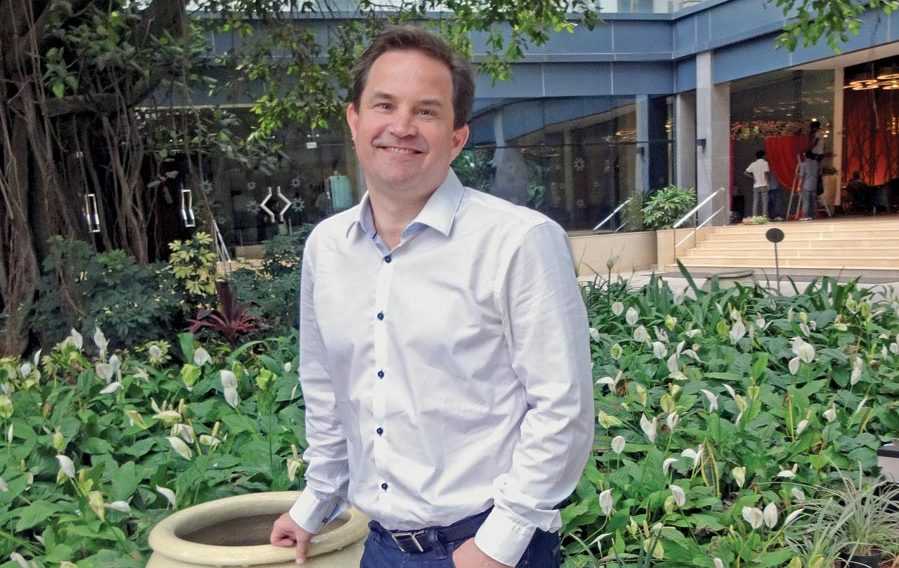
With a growing network of worldwide sales and production facilities, Britannia Garment Packaging is always close to where its customers are, serving them with timely delivery of high-quality labels and packaging through facilities in many countries including India and Bangladesh. Being geographically diverse in their services, the company works as a single entity – ‘One company worldwide’ – where its customers receive the same level of consistency in quality. Through a global strategy of entering a new market through partnership, the company focuses on the importance of people and ethical values to grow business. On one of his whirlwind visits to the country, Paul Brownhill, Group Chief Executive, Britannia Garment Packaging, shares with Apparel Online the guiding vision that drives business at Britannia…
Finding the right partner is fundamental to Britannia’s expansion policy, and through partnership with Aranganathan J, (known as AJ), MD, Sainmarks Industries, they entered the Indian market around 5 years ago tapping into his expertise of the market as well as the product category. Concentrating on good business knowledge and a sound working environment for its people, Paul who has very rooted beliefs comments, “if you look after your people they look after the customer, and if you look after the customer you grow your business.” No wonder, the company puts great emphasis on choosing the right partner for its global operations.
In a partner the company looks for good business knowledge and one who cares about doing ethical business and for the people involved in it. “I think the Western-developed world is quick to judge and perceive that our integrity is better than the Asians, but the reality is that it’s just different. If we believe this then we have the basis to work together in terms of values with different beliefs and that’s what drives the way in which we want to do business in various countries,” says Paul. While entering any new market, the company’s first and foremost focus is on developing relationships with its partners. “We have an edge over some large players because what they do is go into a market and work according to what they think is right, which I think is an inevitable degree of imposition,” reasons Paul.
In the larger global structure, the Indian subcontinent is at the ‘heart’ of Britannia’s future growth, as the company firmly believes that the region has a lot of potential and opportunity. After setting up a strong manufacturing base in Tirupur, the company is now ready to open its second factory in Delhi to provide better customer service to the north. Even though they are late entrants into the Indian market, Paul feels that the time is right. “It was more about where our retailers were pushing us; and our retailers from the UK pushed us first to China, Turkey, and Sri Lanka. So India curiously was something that came late,” informs Paul. Though the push came late, the company is focusing its attention to the growing Indian market as there is an increasing demand from the retailers to source from the country. “As the cost in China is growing very quickly, India is becoming more competitive and its quality and standards are improving. For me the quality of Sri Lanka for many years was far higher than India, but with technology advancement the business in India has grown and the quality has improved significantly. I would say now India is at par with other preferred countries,” claims Paul. The Tirupur factory is wonderfully laid out, creating the right working environment with lots of open spaces, greenery and natural light; it is also planned for the premises to have a woven facility with the latest European machines.
Apart from India, the company also works in Bangladesh and has seen various improvements in the country mainly post the Rana Plaza tragedy. “Improvements in terms of the working environment, safety measures, being treated fairly, etc. is evident in Bangladesh today. The worst we can do is to pull out and go somewhere else. So I think it’s really important to continue to invest in the right ways, which we have done through the new factory,” claims Paul. The company has also started an investment programme in Sri Lanka. “We moved into new premises last year and we have already started to build a production capability which will be supplemented during May with the addition of a Xerox digital press to complement our digital infrastructure in our other countries,” informs Paul.
Doing ethical business is at the core of expansion for Britannia including safety measures and compliance, which also forms a major crux of its day-to-day operations at all its facilities. The company is also working towards recycled environmental friendly boards and the new factory setup in both Bangladesh and India is such that reductions in electricity costs are taken into account, balancing both cost and the environment.
Working with major UK based retailers, it’s important for the company to provide transparency and visibility to the brands, while maintaining on-time deliveries. The company works through nominations from a majority of UK based retailers, one of its biggest clients being George Clothing, which is a part of Walmart. “I have to say that Walmart is really taking a lead on compliance issues particularly in Bangladesh,” shares Paul.
Recognising that the garment packaging market which is already worth in excess of US $ 3.5 billion is continuously growing as the demand for labels is increasing, from a single label to multiple ones on the product, Britannia is expanding its reach and manufacturing capabilities. “When retailers are in more than one country they try to cater to all those countries through labels or wash labels in multiple languages sometimes 30 so the label is getting longer. But this is also an opportunity for us to manage the data and to improve our services, not only in India but also Turkey, Egypt, Bangladesh, Sri Lanka, etc.,” maintains Paul.
Interestingly, the sampling for various retailers is happening where the bulk of its products are sourced from; for instance, if a buyer wants to source 25 per cent from China and 25 per cent from India, the sampling will take place in both the places to attain the same level of consistency. “Because of the shrinking lead times, if we sample in only one country, then we have to wait for the other country to sign off which makes it difficult to complete delivery on-time. That’s why the sampling happens in both the countries where the materials are sourced from,” reasons Paul. However, the product development of the company still primarily takes place in the UK factory, while a small portion of it in India and Honk Kong.
Though the company started its initial business with its UK factory, today it has spread its operations across 9 countries, while still maintaining the UK manufacturing facility. “We are very proud to say that we produce in England. I think there is going to be a continuous requirement in the UK and we have stood by that over the last 15 years when many of our competitors have significantly reduced in the UK. The ‘Made in Britain’ movement is surely happening but it’s still small,” says Paul.
Working with local partners has provided a huge impetus to Britannia’s business as its global turnover, which five years earlier was around US $ 12 million, has now increased to US $ 30 million. This synergy between the local and global has pushed the company to look at new market opportunities in South-East Asia, North and South America, Mainland Europe and also manufacturing in Africa as the need for garment packaging suppliers to be close to where garment production takes place increases. Still, the company faces challenges not just in terms of finding the right partner to enter a new market but also to find the right board material, fabric, inks and getting the right quality and consistency which is of prime importance to the retailers when the product hits the stores. But the company is confident of achieving the right partner and suppliers and is aiming towards future growth through having the right team, the right people and right ethics in place. “In terms of people without question we are confident, and in terms of technology we are heavily investing in our technology platform, ERP, MIS capability to achieve visibility and also provide the retailers with transparency,” concludes Paul.

Leave a Reply